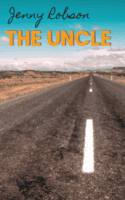Inside my home, it is quiet now. At least that! The yelling and the shouting, the weeping and the wailing are done with, for the moment anyway. And I can lie here on this patch of grass in the night shadows, gazing up at the stars. How golden they are! How mysterious! They twinkle down as if they know secrets of the world far beyond my hillside village. One day when I am older, I will leave Boseja, I think. I will travel out into the world and discover those secrets for myself. Perhaps Refilwe will come with me?
I spoke to her today, for the very first time, down at the Highway where her mother runs a butchery stall. Where truckdrivers stop for diesel and a rest, and a woman or two. Where flies and smells and curses fill the air.
I said, “Your mother has a load of meat in today.”
Refilwe said, “This is true.”
I said, “My name is Itseng.”
She said, “I know.” And she smiled her secret smile while the wind tugged at her blue dress. It made me wildly happy that she knew my name. Even though my friends, Thabo and Tshepiso, were mocking me from behind a petrol pump. Even though they said to me, “How can you speak to such people? Have you lost your mind? Even if she is pretty. Still she is a vendor’s daughter. You know what that means!”
The vendors down on the Highway are not accepted in our village. They live apart in their shacks on the dusty roadside. My community, up on the slopes of Boseja Hills, look down upon them greatly.
“You will set tongues wagging,” said Tshepiso. “Again, Itseng! Surely you have had enough of things said behind your back?”
My village is full of wagging tongues and shaken heads. Full of gossip and harsh judgement. It lies heavy on the night air around me, here beneath the stars.
Inside my home now, my parents move about as in a daze. Like survivors of some tornado. I can see them through the kitchen door. My mother does what she must among the pots over the gas stove. But she stares with blank eyes into the flames. My father picks up a chisel, then looks at it uncertainly, not remembering why he picked it up.
But at least the weeping and wailing, the yelling and anger, are done with. The storm is over. Only wrecked branches and silence are left behind.
And who would have believed it? Who would have thought? It was my elder brother Larona who caused such a storm! Yes, Larona! He was always the golden son, praised by past teachers, admired by neighbours.
“You are blessed with such a son,” the village women told my mother with envy.
“He has grown into a fine young man,” the men told my father, with respect. “Soon he will take his rightful place in our fine community.”
On the other hand, I have always been the problem child, the wild child. The black sheep of the family. Village elders shake their heads when my name is mentioned.
Yet, in the end, it was my elder brother who brought calamity and shame and disgrace on our family. And set the tongues of Boseja wagging with gossip.
Yes, my brother Larona!
Tell us what you think: Why do people like to gossip about others?


